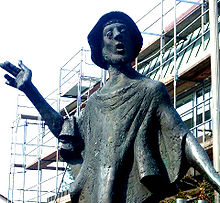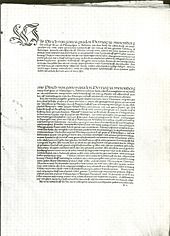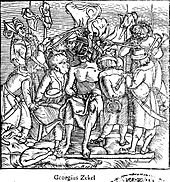1514
Portal history | Portal Biographies | Current events | Annual calendar
◄ |
15th century |
16th century
| 17th century
| ►
◄ |
1480s |
1490s |
1500s |
1510s
| 1520s
| 1530s
| 1540s
| ►
◄◄ |
◄ |
1510 |
1511 |
1512 |
1513 |
1514
| 1515
| 1516
| 1517
| 1518
| ►
|►►
| 1514 | |
|---|---|
|
Duke Ulrich von Württemberg suppresses the uprising of poor Konrad . |
The English princess Mary Tudor marries the French King Louis XII. |
|
With the Battle of Orsha , Russian expansion to the west is temporarily stopped. |
|
| 1514 in other calendars | |
| Armenian calendar | 962/963 (turn of the year July) |
| Ethiopian calendar | 1506/07 |
| Aztec calendar | 8th house - Chicuei Calli (until the end of January / beginning of February: 7th Feuerstein - Chicome Tecpatl ) |
| Buddhist calendar | 2057/58 (southern Buddhism); 2056/57 (alternative calculation according to Buddhas Parinirvana ) |
| Chinese calendar | 70th (71st) cycle
Year of the Wood Dog甲戌 ( at the beginning of the year water tap 癸酉) |
| Chula Sakarat (Siam, Myanmar) / Dai calendar (Vietnam) | 876/877 (turn of the year April) |
| Dangun era (Korea) | 3847/48 (October 2/3) |
| Iranian calendar | 892/893 |
| Islamic calendar | 919/920 (turn of the year 25/26 February) |
| Jewish calendar | 5274/75 (September 20/21) |
| Coptic calendar | 1230/31 |
| Malayalam calendar | 689/690 |
| Seleucid era | Babylon: 1824/25 (turn of the year April)
Syria: 1825/26 (turn of the year October) |
| Spanish era | 1552 |
| Vikram Sambat (Nepalese Calendar) | 1570/71 (turn of the year April) |
In 1514 the Saxon feud between Duke Georg von Sachsen and the East Frisian Count Edzard I begins , whose fighting takes place mainly in East Frisia , and in Württemberg the uprising of " Poor Konrad " breaks out, which was defeated by Duke Ulrich's troops in the same year is bloodily knocked down.
Poland-Lithuania loses the city of Smolensk to the Grand Duchy of Moscow , but with the victory in the Battle of Orsha can temporarily halt Russian expansion to the west.
Events
Politics and world events
Saxon feud
The predominantly on East Frisian occurring soil Saxon feud between Duke George of Saxony and because of his support of the rebellious city of Groningen with outlawed occupied East Frisian Count Edzard I. begins:
Johann V von Oldenburg , who wants to give his county access to the North Sea at Edzard's expense, attacks the Butjadinger Frisians and defeats them in the battle of Langwarden . At the same time, the Brunswick Duke Heinrich I invaded East Frisia with an army of 20,000 men and besieged the Leerort fortress, which was only defended by a few farmers and soldiers . However, he was killed there on June 23 by an aimed cannon shot. The troops, which have become leaderless as a result, withdraw from East Frisia. Heinrich's son Heinrich II. Succeeds Duke of Braunschweig-Lüneburg and Prince of Braunschweig-Wolfenbüttel . He is the last Catholic prince in the Lower Saxony area.
With the support of the East Frisian chief Hero Omken, the Count of Oldenburg is now taking several castles in East Frisia. The fortress Stickhausen goes so lost. Edzard has to withdraw and has the Meerhusen monastery set on fire to cover his retreat . Aurich is besieged and destroyed as a result of the fighting and arson. On another front, land servants of the Black Guard plunder and destroy several soldiers and castles. Altgödens Castle was destroyed and Kniphausen Castle was taken. In June, the north was sacked and the Black Guard turned to Oldersum , where a first battle took place on June 14th . Under the leadership of Ulrich von Dornum and Hicko von Oldersum , however, the village was defended. A second attempt to take the village failed on August 16 .
The uprising of the "poor Konrad" in Württemberg
In protest against the consumption taxes introduced by Duke Ulrich von Württemberg in the previous year and especially against the reduction of the weights required for trade , Peter Gaiß from Beutelsbach leads a divine judgment on May 2nd , in which the Duke's new weights sink into the Rems near Großheppach . When the authorities asked for the stones to be returned the next day, he escalated the situation by ringing the storm bell in the chapel and explaining to the gathering peasants that he was poor Konrad , at that time probably also a synonym for the common man, and moved with a growing crowd of rebels in front of Schorndorf , where they impress Duke Ulrich so much that he lifts the unpopular tax. As a result, the situation in the Rems valley calmed down temporarily.
But already on May 7th, the pastor of Grüningen, Reinhard Gaisser, openly called for an uprising against Vogt Philipp Volland , whom he accused of abuse of office and grain speculation at the expense of the farmers. Volland, who is besieged in his house by the rebels, makes some minor concessions and plays for time while he passes several situation reports to Duke Ulrich. Peter Gaiß is also moving through the country again and trying to get people to riot. After various tumults across the country, Duke Ulrich in Schorndorf himself barely escaped the rebels in July, who remained in their hands for ten days. Duke Ulrich then convenes an extraordinary state parliament and relocates it to Tübingen in order to prevent the common people from having a say.
On July 8th, the Treaty of Tübingen is signed between Duke Ulrich and his estates . In return for assuming the ducal debts, the latter are given a say in tax collection and national defense. In return, the honesty assures their support in suppressing the uprising of poor Konrad. Reinhard Gaisser continues to call for an uprising from the pulpit and rail against the “lazy compromise”, but he underestimates the new room for maneuver that the Duke has been given with the treaty, which now recruits a mercenary army and thus opposes the rebels can.
The peasants finally set off on a march through Württemberg in the hope of being able to persuade others to move in and thus strengthen themselves further. They move to their camp on the Beutelsbacher Kappelberg, where the crowd is getting smaller and smaller instead of larger in view of the news of well-armed ducal troops. Finally poor Konrad collapses without a fight, without a sound. Ducal troops occupy the Rems Valley without resistance and drag the rioters, whom they can get hold of, to Schorndorf, where they are beheaded on August 9th . Around 1,700 farmers from the Rems Valley are tortured, whipped and branded and sentenced to heavy fines and the loss of their rights of honor.
Pastor Gaißer, who does not fall under the Württemberg criminal jurisdiction, gets away with a warning from the Bishop of Speyer, Georg von der Pfalz , who is well aware of his cause , and continues to be pastor in the Bartholomäuskirche in Grüningen.
Other events in the Holy Roman Empire
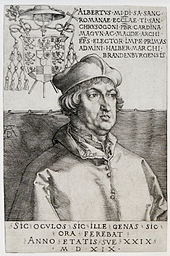
Albrecht von Brandenburg succeeds Uriel von Gemmingen , who died on February 9, as Archbishop and Elector of Mainz . Since the 24-year-old has been Archbishop of Magdeburg and administrator of the Halberstadt diocese for a year at this point in time , he is violating the canonical ban on holding more than one bishopric . He rules from Moritzburg in Halle an der Saale during his entire term of office .
- June 11 : Elector Friedrich III. von Sachsen gives his hometown Torgau the coat of arms that is still valid today.
- On July 27th, Ulmer Landsknechte occupied the city of Geislingen on behalf of the council and arrested the leaders of the so-called Geislingen uprising , who will be tried in Ulm on August 11th. The baker Lienhart Schöttlin, who is said to have the saying: "Better to help Steinisch than ulmisch", is the only one of the rebels to be executed by the sword, the others are partly banished and partly punished.
- October 21 : After the death of his father Alexander , Ludwig II becomes Count of Pfalz-Zweibrücken and Veldenz . The minor is temporarily under the guardianship of his mother Margarete von Hohenlohe-Neuenstein .
France / England / Scotland
- May 18 : Heir to the throne Franz von Orléans-Angoulême marries Claude de France . Due to the enmity between the two mothers of the bride and groom, Luise of Savoy and Queen Anne de Bretagne , the marriage could only be concluded after Anne's death on January 9th .
- August 14th : The Scottish royal widow Margaret Tudor secretly marries Archibald Douglas, 6th Earl of Angus . That costs her the reign for her underage son Jacob V , which is transferred to John Stewart, 2nd Duke of Albany .
- October 9 : The 52-year-old French King Louis XII is married in Abbeville . and 18-year-old Mary Tudor , the youngest daughter of King Henry VII of England . A proxy wedding had already taken place on August 19th . On November 5th , Mary is crowned Queen of France .
Portugal and its colonies
- May 15 : After Fernão de Magalhães allegedly engaged in illegal trafficking with the Moors while he was stationed in Morocco, he was released from Portuguese military service. He then goes to Spain.
- King Manuel I carried out an administrative reform in Portugal . The empire is divided into six comarcas , several concelhos are created, numerous city rights are granted or renewed.
- Portugal developed the place Mazagão in what is now Morocco into a port fortress .
- King Manuel I is the first and so far only person to receive a second Golden Rose from the Pope.
Hungary
- First siege of Timisoara : A peasant army under György Dózsa , which fights against the feudal prerogatives of the Hungarian nobility such as manorial power and subservience , falls in the Kreischgebiet and the Banat. The peasants then besiege Timisoara , but are caught by a mercenary army under Johann Zápolya on July 15th , the voivode of Transylvania , with the support of Stephan Báthory von Somlyó, was devastated. Dózsa was cruelly tortured and executed on July 20th . After the uprising was put down, the Hungarian magnates enacted laws that stipulate the serfdom of peasants for centuries to come.
- When the Serbian despot Ivaniš Berislavić died , his son Stefan was only ten years old, which is why he was not awarded the title of despot until 1520 .
Poland-Lithuania / Russia
- February 2nd : Georg von Schnitzenpaumer , an envoy from Emperor Maximilian I , arrives in Moscow via Königsberg to win the Russian Grand Duke for a European coalition against the Jagiello-Hungarian striving for supremacy in East Central Europe. In addition to the Grand Duchy of Moscow, the Teutonic Order , Denmark, Brandenburg, Saxony and the Principality of Wallachia are said to belong to it. As a result of the talks, a formal alliance agreement is concluded, while preparations for Moscow's third campaign against Smolensk are under way.
- July 30 : Poland-Lithuania loses the important Smolensk fortress and the surrounding area to the Russian Grand Duchy of Moscow in the Muscovite-Lithuanian War of 1512–1522 . The Russian troops, which were put on the march at the end of May, very quickly closed the siege ring around the fortress. Grand Duke Vasily III. set out from Moscow on July 8th and gave the order to bombard Smolensk on July 29th .
- September 8th : In the Battle of Orsha , the Grand Duchy of Lithuania in alliance with the Kingdom of Poland under the command of Hetman Konstanty Prince Ostrogski defeats the Russian Grand Duchy of Moscow under Ivan Andreevich Chelyadnin, temporarily stopping its western expansion. King Sigismund I benefited from the victory for propaganda purposes, but failed in the recapture of the Smolensk fortress occupied by the Muscovites. Smolensk remains under direct Russian rule until 1611 .
Asia
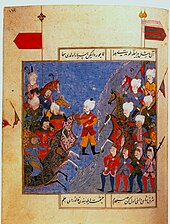
Sultan Selim I of the Ottoman Empire strikes on August 23 the Persian Safavid Rulers Ismail I. Shah in the battle of chaldiran devastating thus winning the rule in eastern Anatolia . Immediately after the battle, Sultan Selim advances and conquers the Safavid capital Tabriz . Numerous craftsmen are brought to Istanbul from here. Because of the approaching onset of winter, the campaign is finally canceled. The Safavids are moving their capital to Qazvin in the meantime . The borderline after the battle has remained almost unchanged to this day. The Safavids no longer pose a serious threat to the Ottomans for the next 100 years. With the victory of the Ottomans, the Kurdish feudal lords and local princes change sides and affirm their loyalty to the Ottomans. With the conquest of Eastern Anatolia, Sultan Selim I created a basis for the later conquest of Mameluke Egypt and also gained control over a section of the Silk Road .
America
The Spanish conquistador Vasco Núñez de Balboa will return to Darién on January 19th from his voyage of discovery that brought him to the “ Southern Sea ” . Only a few of his companions survived the expedition and Balboa is also close to death on his arrival. Due to intrigues, he was deposed as governor of Darién in the same year and replaced by the soldier Pedro Arias Dávila , which ruined his plans to conquer the fabulous gold country in the south , which he learned about on the trip. Dávila arrives in Darién on June 30th . Among others, the adventurer Diego de Almagro el Viejo , who met the soldier Francisco Pizarro during this time , and the 14-year-old Hernando de Soto are among his entourage .
- Francisco de Garay succeeds Juan de Esquivel, who died last year, as the second Governor of Jamaica .
- August 25. 1514 or 1515 : Governor Diego Velázquez de Cuéllar founded on the south coast of Cuba place Havana , which must be installed but due to the prevailing mosquitoes after a few years to the north.
Africa
The dynasty founder Manga from the Fula tribe founds the theocratic empire of Denanke (with a traditional religion ) in West Africa . He makes Tekrur the capital.
science and technology
- April 13th : Georg Tannstetter , member of the Vienna astronomical school , publishes the work Viri Mathematici quos inclytum Viennense gymnasium ordine celebres habuit , an early approach to the history of science . It describes in detail the astronomers and mathematicians who worked in Vienna from 1384 to this point in time . Tannstetter presents extensive lists of her works for five of them, namely Johannes von Gmunden , Georg von Peuerbach , Johannes Regiomontanus , Johannes Stabius and Andreas Stiborius . A total of around 170 book titles on predominantly mathematical and astronomical topics appear in these Viri Mathematici .
- To solve the longitude problem in navigation , Johannes Werner suggests using the distance from stars to the moon .
- The so-called Stab-Werner heart-shaped projection developed by Johannes Stabius and Johannes Werner , the first true-to-area representation of the globe, is published for the first time in print.
Culture
| Culture | |
|---|---|
|
menagerie

King Manuel the Lucky of Portugal gives Pope Leo X , who was elected last year , an elephant from India as a gift, along with numerous other wild animals. The boat trip from Lisbon to the Italian coast is unproblematic, but the onward journey overland sometimes gets out of control due to the masses of onlookers. Hanno , who was successfully brought on March 19 by a large delegation led by Tristão da Cunha , became the Pope's favorite animal .
Visual arts
- August 30th : Antonio da Correggio begins on behalf of the monks of the Minorite monastery in his hometown Correggio with the creation of an altarpiece with the Madonna .
Albrecht Dürer creates the two copperplate engravings Melencolia I and Saint Jerome in the case . Together with the work Knight, Death and the Devil from 1513, they form Dürer's “master engravings”, which are characterized by a complex iconography and symbolism. According to a common interpretation, the three master stitches represent three different ways of life.
Poetry
- March 12th : Joachim von Watt receives the poet's crown from Maximilian I as poeta laureatus .
- Ulrich von Hutten is returning to Germany after spending several years in Italy. He met Erasmus von Rotterdam personally for the first time in Mainz .
society
- December 5 : The Salbuch of the Naumburg Monastery is created. This richly illustrated book is the documentation of a border adjustment between the Cyriacus monastery Naumburg and the village of Kaichen . The text of the document lists the seven land clerks by name, who measured the district and provided it with boundary stones. This is followed by a description of the limits.
- Stable master Hans von Hutten marries Ursula Thumb von Neuburg , the previous secret lover of his master Ulrich von Württemberg , which leads to a break between the two.
- The city of Venice forbids the gilding of marzipan as an exaggerated luxury.
religion
Christianity
- January 12th : Pope Leo X. removes Madeira from the Archdiocese of Tangier and elevates it to its own suffragan diocese under the Patriarchate of Lisbon . The diocese of Funchal is to be responsible for all overseas possessions of Portugal . The previous jurisdiction of the Order of Christ over the Portuguese overseas territories is canceled with the bull Pro excellenti praeeminentia . In the same year the church of Funchal was completed and made a cathedral .
- Adolf von Anhalt-Zerbst becomes Bishop of Merseburg as the successor to Thilo von Trotha , who died on March 3rd .
- August 25th : Bernhard von Cles becomes Bishop of Trento without being ordained a priest.
- November 13th : Antoine Bohier Du Prat is appointed Archbishop of Bourges .
- At the site of today's pilgrimage church of the Assumption of Mary on the Hohen Peißenberg , farmers from Peiting are building a brick chapel for the first time.
Islam
- With the conquest of Eastern Anatolia by the Ottoman Empire, many followers of Shah Ismail I fled Anatolia. The remaining Turkmen tribes get on the defensive and with them Alevism . Sultan Selim I spreads Orthodox Sunniism . In contrast, the Persian Safavids turned to Orthodox Shiaism .
Disasters
- January 10 : A fire breaks out on the Rialto in Venice , which kills almost the entire district.
- September 29th / 30th : Jerome flood on the Dutch coast
Born
Date of birth saved
- February 16 : Georg Joachim Rheticus , Austrian mathematician, astronomer, theologian, cartographer, instrument maker and physician († 1574 )
- February 22 : Tahmasp I , Shah of Persia from the Safavid dynasty († 1576 )
- February 25 : Otto von Waldburg , Bishop of Augsburg and Cardinal († 1573 )
- March 23 : Lorenzino de 'Medici , Italian writer, member of the Medici family († 1548 )
- April 2 : Guidobaldo II. Della Rovere , Duke of Urbino († 1574 )
- April 6 : Joachim Mörlin , German theologian, pastor and reformer († 1571 )
- April 7th : Joachim I. von Alvensleben , lord of the castle in Erxleben, scholar and reformer († 1588 )
- June 16 : John Cheke , English scholar and statesman († 1557 )
- August 13 : Joachim Mynsinger von Frundeck , German lawyer of the humanist era († 1588 )
- September 12 : Philipp , Duke of Mecklenburg († 1557 )
- September 20 : Philip IV , Count of Hanau-Lichtenberg († 1590 )
- December 17 : Johann Basilius Herold , German printer, humanist, historian, publicist and forger († 1567 )
- December 31 : Andreas Vesalius , Flemish anatomist, is considered the founder of modern anatomy and morphological thinking in medicine († 1564 )
Exact date of birth unknown
- Jean d'Amboise , French surgeon († 1584 )
- Andreas Aurifaber , German doctor († 1559 )
- Francis Knollys , English minister († 1596 )
- Hai Rui , Chinese civil servant († 1587 )
- Maha Thammaracha , King of the Siamese Kingdom of Ayutthaya († 1590 )
Born around 1514
- Giovanni Animuccia , Italian composer of church music († 1571 )
- Caspar Landsidel , German educator and rhetorician († 1560 )
- Johann Placotomus , German physician and educator († 1577 )
- Franz II von Taxis , German nobleman, postmaster of Charles V († 1543 )
- 1514/ 1517 : Francisco Hernandez de Toledo , Spanish physician and naturalist († 1587 )
Died
First half of the year

- January 9 : Anne de Bretagne , Queen of France (* 1477 )
- February 9 : Uriel von Gemmingen , Elector and Archbishop of Mainz and Imperial Chancellor (* 1468 )
- March 5 : Thilo von Trotha , Bishop of Merseburg and Chancellor of the University of Leipzig (* 1443 )
- March 7 : Řehoř Hrubý z Jelení , Czech writer, translator and humanist (* around 1460 )
- March 11 : Jan Bouwensz , counselor of Holland (* around 1452 )

- April 11th : Donato Bramante , Italian painter, builder and founder of High Renaissance architecture (* 1444 )
- May 3 : Anna of Brandenburg , Duchess of Schleswig and Holstein (* 1487 )
- May 16 : Barbara Dürer , citizen of Nuremberg, mother of Albrecht Dürer (* 1452 )
- May 24th : Wolfgang von Bayern , Bavarian nobleman (* 1451 )
- May 30th : Wolfgang Roritzer , German master builder and sculptor
- June 16 : Margarete von Pfalz-Zweibrücken , Countess of Nassau-Wiesbaden-Idstein and Abbess of the Marienberg Monastery (* 1456 )
- June 23 : Heinrich I , Duke of Braunschweig and Lüneburg and Prince of Braunschweig-Wolfenbüttel (* 1463 )
Second half of the year
- 14 July : Christopher Bainbridge , Archbishop of York (* 1462 / 63 )
- July 20 : György Dózsa , Transylvanian nobleman and leader of the Hungarian peasant uprising (* around 1470 )
- August 2 : Gjon Kastrioti II , Albanian prince and count in the Kingdom of Naples (* 1456 )
- October 7 : Bernardo Rucellai , Florentine scholar and diplomat (* 1449 )
- October 21 : Alexander von Pfalz-Zweibrücken , Count Palatine and Duke of Pfalz-Zweibrücken and Veldenz (* 1462 )
- November 27 : Katharina von Schwarzburg-Blankenburg , Countess von Hanau-Münzenberg (* after 1470)
- November 28 : Ladislaus Prager , German Knight, Hereditary Marshal of Carinthia, Imperial Councilor and Truchsess, Captain of Wiener Neustadt, Caretaker of Enns and Chamberlain of Emperor Friedrich III.
- November 28 : Hartmann Schedel , German historian (* 1440 )
- December 4 : Peter Offenburg , Mayor of Basel (* 1458 )
- 14 December : Guillaume Briçonnet , Archbishop of Narbonne and Reims, Bishop of Nîmes (* around 1445 )
Exact date of death unknown
- Ivaniš Berislavić , Serbian despot and Banus of Jajce
- Adam von Bochinia , Polish doctor and humanist
- Miguel Díaz , Spanish explorer
- Archibald Douglas, 5th Earl of Angus , Scottish nobleman (* around 1453 )
- Georg Glockendon , illuminator from Nuremberg
Died around 1514
- 1514/ 1517 : Luca Pacioli , Italian Franziskaner, mathematicians and economists (* about 1445 )




